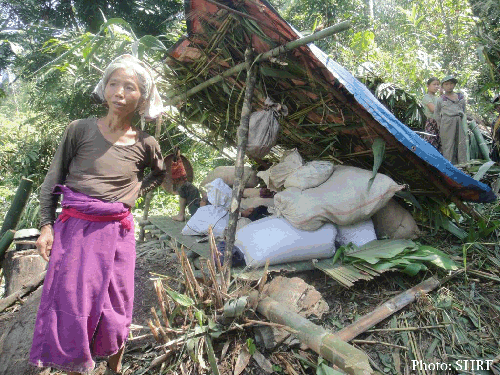Reports this week from Kachin and Shan States confirm rape is still being used as a tactic by the Burma Army to demoralise and terrorise ethnic communities.

Shirley Seng, a spokeswomen working with the Kachin Women’s Association Thailand, told Karen News that since June 9, Burma army soldiers have raped 32 women.
“No woman is safe from these soldiers. In the last six weeks 32 women and girls in Kachin State have been raped – 13 of those were killed.”
Other ethnic women groups confirm the rapes are not only happening in Kachin but accuse the Burma Army of using sexual violence as a systematic weapon against ethnic people in Mon, Shan, Chin and Karen State.
Charm Tong from the Shan Women’s Action Network says her groups have been documenting the abuse against women for decades and says age is no deterrent…young, old, or pregnant.
Charm Tong describes how earlier this month a Burma army patrol from Light Infantry Battalion 513 robbed a Shan village and raped four women and girls.
“The youngest, Nang Mon, 12, was raped in front of her mother who was beaten when she tried to protect her daughter. Villagers could do nothing. Nang Lord who was due to give birth, was thrown on the ground and raped. Nang Poeng was caught outside the village, beaten, stripped and raped.”
The rape of ethnic women in Burma is well documented by international human rights organizations, regional community groups and the United Nations.
In late May, in a statement to journalists, at the Bangkok based Foreign Correspondents Club of Thailand, the Special Rapporteur on the Situation of Human Rights in Myanmar, Tomas Quintana, highlighted the Burma army’s involvement.
“Systematic militarization contributes to human rights abuses. These abuses include land confiscation, forced labor, internal displacement, extrajudicial killings and sexual violence.”
Charm Tong takes and says foreign investment plays a huge part in the militarization of ethnic regions.
“Northern Shan State is of crucial importance, the [Burma] army is trying to secure the area for major Chinese investments, including hydropower dam sites and transnational gas and oil pipelines. The Burma army now has a quarter of their battalions based there. Where there are pipelines, dams, timber and other natural resources there are well-documented cases of abuse of local people. ”
Charm Tong says foreign governments and investors working in Burma need to speak out about the atrocities.
‘Business as usual means ongoing rape for women and girls in our communities.”
Naw Blooming Night Zan, joint secretary of the Karen Women’s Organisation, in an interview with Karen News said.
“The Burma army uses rape as a weapon against ethnic women. The Burma army tortures ethnic people as if they have a licence to do so and they are never held responsible for their actions. They have a new government, but it is only a veneer, underneath the surface it is still the same policies of the military.”
In February 2010, the Karen Women Organisation published a report, Sharp Knives, based on the testimonies of 95 women chiefs. The report explains that women are replacing men as village chiefs because men “are more likely to be killed by the Burma army.”
The report points out that the reason women became chiefs was that “men were reluctant to risk their lives as chiefs, women stepped in to assume leadership in the hope of mitigating abuses.”
The 95 testimonies of the women chiefs in the report proved that were not to be the case – they faced constant threats, systematic abuse and sexual violence from the Burma army.
The testimonies are harrowing. A women chief tells how she was punished by the soldiers for running away when her village was attacked – in retaliation the soldiers gang-raped her 15-year-old daughter.
In February 2007 the Karen Women Organisation released another report, State of Terror, based on 4,000 documented cases of human rights abuses by the Burma army. The report stated that, “rape has been, and continues to be used as a method of torture to intimidate and humiliate the civilian populations, particularly those in ethnic states.”
As in reports by other organisations, KWO found that “many of the rapes are perpetrated by senior military officers or done with their complicity.”
The contents of the report cite cases 57 and 58 were two 23-year-old women were repeatedly raped vaginally and orally by a soldier under the command of Major Pone Tint in Dooplaya District. “If we didn’t do it he would shoot us dead.”
Case 43 – “After raping her they killed her by shooting into her vagina, no action was taken [against the rapist].”
The Women’s League of Burma in a 2006 paper titled, War Crimes in Burma, reported that the Burma army was targeting women for rape and various forms of sexual violence.
“Rape is being used by the regime’s army as a strategy of war against different ethnic groups, to attack them, humiliate them and demoralize them, in order to establish control over their land and resources.”
Charm Tong says there is too much evidence for Asean, the UN and the international community to keep ignoring that Burma’s human rights abuses are linked to development projects.
“Asean and the UN Security Council’s inaction are letting the rapes and crimes against the Burmese people go on and on. They need to do something like they have in many other places like Libya, Bosnia and African countries.


